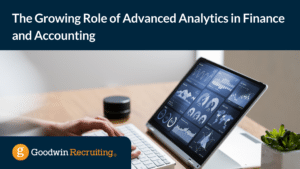The Growing Role of Advanced Analytics in Finance and Accounting
Goodwin Recruiting | Financial Services, Hiring Advice, Industry News | October 11, 2023

Big data and advanced analytics are transforming the ways finance and accounting organizations and professionals perform their roles. Analyzing financial data from across an organization and third-party sources, and extracting and acting on those valuable insights, are dramatically improving how organizations manage finances, make strategic business decisions, understand customers, and excel in risk management.
Advanced analytics technologies and techniques are used by finance and accounting professionals in nearly every industry, not just the finance sector and accounting firms. Companies in manufacturing, hospitality, healthcare, and more are using data analytics techniques and solutions to their greatest advantage.
Here are some revelations and outcomes companies are experiencing:
- Making faster and smarter organization-wide decisions
- Monitoring and measuring sales, receivables, and cash flow in real time
- Determining whether the business strategy is working and productivity is strong
- Identifying strengths and weaknesses in internal processes
- Improving operations
- Allocating resources, budgeting, and spending more strategically
- Identifying emerging trends and capitalizing on the right opportunities
- Gaining a current, accurate understanding of existing and prospective customers
- Forecasting the buying behaviors of customers and prospects
- Refining research and development efforts
- Observing competitor strengths and weaknesses
- Monitoring, measuring, and enhancing customer experiences
- Driving stronger sales and profitability (including through better upselling and cross-selling)
- Anticipating, mitigating, and avoiding market and competitive risks
- Improving data and financial security
- Conceiving and implementing more effective marketing and sales programs
The list goes on!
Build a rock-solid business strategy in uncertain times
It can be challenging to navigate today’s chaotic business environment, which is why data-driven decision-making is so critical. An informed strategy is where the goals and initiatives of successful companies are born. It’s only logical that businesses tap their finance and accounting organizations to help research, analyze, and solidify plans. Through statistical analysis of data through technology, companies have real-time data – historical, current, and predictive – to become more confident in their business models and go-to-market strategies.
“Executing on a financial strategy begins with having a fundamental understanding of the financial position that the company and projects are actually in. This means being able to answer questions with hard financial and operational data, not gut alone,” says Bassem Hamdy, author of The Importance of Data Analytics in Finance. “The lighthouse in this uncertainty is the ability to use advanced data analytics to better manage financials. When a company is able to masterfully forecast cash flow and execute on its strategic financial visions, it is empowered to serve its market and clients for decades to come.”
Mine data for the gold that lives within it
Since the daily operations of nearly every business today are technology-driven, sources of valuable data are plentiful. That data – financial, operational, market, customer, and more – while likely housed in different systems and primarily in raw form, is just waiting to be collected, cleaned, filtered, analyzed, and turned into important and actionable insights.
Data mining is the process of extracting information from large datasets and organizing it in ways that are easily analyzed. Once data is collected, it is cleaned and processed to remove irrelevant information. Then, algorithms and statistical models are used to analyze the data and identify the patterns and relationships that produce meaningful insights.
Technology does the heavy lifting! Mining, managing, and analyzing vast amounts of big data calls for advanced data analytics technologies and there are numerous solutions with features and benefits for companies of all types and sizes. Many big data solutions support electronic data collection from various platforms, including internal systems, the cloud, ecommerce platforms, customer relationship management (CRM) systems, sales management systems, accounting and finance systems, and more.
All data mining tools require human intervention, but the best ones are easy to learn, offering intuitive, robust dashboards that combine real-time data, tools, and financial reports all in one place and make textual and visual analyses easy to access – in mere seconds.
See the future through predictive analytics
Big data analytics around business intelligence provide an accurate picture of a company’s current performance status. But what about future performance, not just about the company but also its industry, market, and customers? Enter predictive analytics and prescriptive analytics – which are often used in tandem to reveal what organizations can expect the future to bring (predictive), along with insights that assist in developing a course of action to bring about desired outcomes (prescriptive).
How are these tools used? In the financial services sector, for example, these advanced data analytics tools are used to identify risks, optimize lending and investing decisions, and improve customer targeting. For organizations across many industries, predictive analytics foretell future dynamics like financial, sales, and market trends and customer behaviors by analyzing current and historical data and using a predictive model to forecast future performance and conduct.
Help customers optimize their portfolios
Companies are using advanced data analytics to focus not only on their own product and service portfolios, but also those of their customers. Smart companies know that proactively supporting their customers’ businesses – which involves focusing on their customers’ customers – they are rewarded with their own more profitable businesses. How and why? Simply said, if a company is not providing products and services that its customers and their customers want, it can negatively impact whether customers continue to buy the company’s products and services. Plus, it’s just good business to be a better partner.
It pays to help customers succeed. This type of support is accomplished through market data analysis, much like companies do for themselves, by becoming intimate with customer needs, desires, and motivations, and unearthing factual, current, and predictive information about buying behaviors and what’s working (or not working) in the market. It also involves identifying trends, competitive threats, and areas where improvements are needed. Overall, helping customers optimize their portfolios is about assigning meaning to data analytics results to gain clear direction for advancing a business.
Detect fraud, protect data, and mitigate risk
In September 2023, Forbes published an article called Cybersecurity in Finance: Protecting Client Data and Mitigating Risks. The article cites PWC’s latest Global Economic Crime and Fraud Survey, which found that among 19 categories of economic crime, cybercrime stood out as the most widespread and most disruptive economic crime experienced in the United States and globally.
According to the U.S. Federal Trade Commission (FTC), in 2020, reported losses to business imposters (scammers who falsely claim affiliations with companies) was $196 million. That figure rose to $453 million in 2021 and soared to $660 million in 2022.
These and countless other sobering trends have thrust fraud analytics into the limelight as a first line of defense in detecting the many faces and forms of fraud, protecting data, and reducing risk to companies and their customers. Like many other forms of data analysis, fraud analytics involves the use of advanced analytics, machine learning, artificial intelligence, and other automation tools.
Advanced analytics solutions and techniques are used to arrest sophisticated schemes and prevent their recurrence. These solutions have the capacity to not only identify anomalies and deviations from what is considered normal patterns and behaviors – in transactions, procurement, payments, and numerous other financial activities – but to also detect the likelihood of fraud before it occurs.
Choose an expert in finance and accounting talent recruitment
Goodwin Recruiting is a leading U.S. finance and accounting recruitment agency. Our recruiting experts are specialists in financial planning, investments, asset management, international finance, accounting, and supporting disciplines. We understand the crucial role of advanced analytics in finance and accounting and why companies need accomplished, tech-savvy accounting and finance professionals on their teams to grow, succeed, and mitigate risks in today’s data-driven business landscape.
Contact us when you need access to the nation’s best finance and accounting talent for these and other essential roles:
- Chief Financial Officers (CFO)
- Chief Accounting Officers (CAO)
- Directors of Finance
- Controllers and Assistant Controllers
- Finance Managers
- Senior and Staff Accountants
- Senior Financial Analysts
- Data Analysts
- Data Scientists
- Auditors
- Accounts Payable and Accounts Receivable Staff
- Payroll Staff
- Bookkeepers
Are you a finance or accounting professional interested in advancing your career with a leading organization? Check out our job board or strike a relationship with one of our recruiters today.
Share This Article
















































